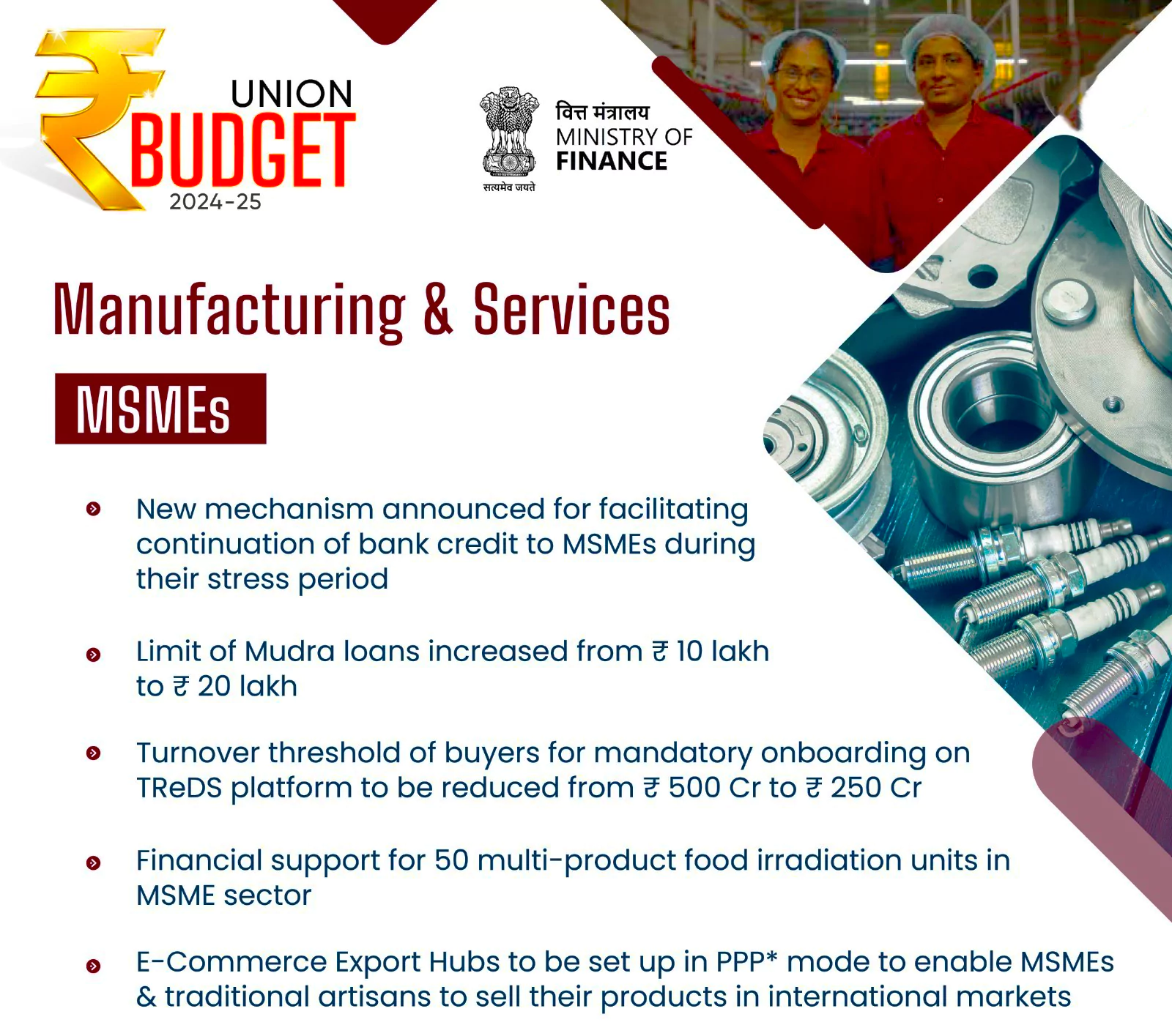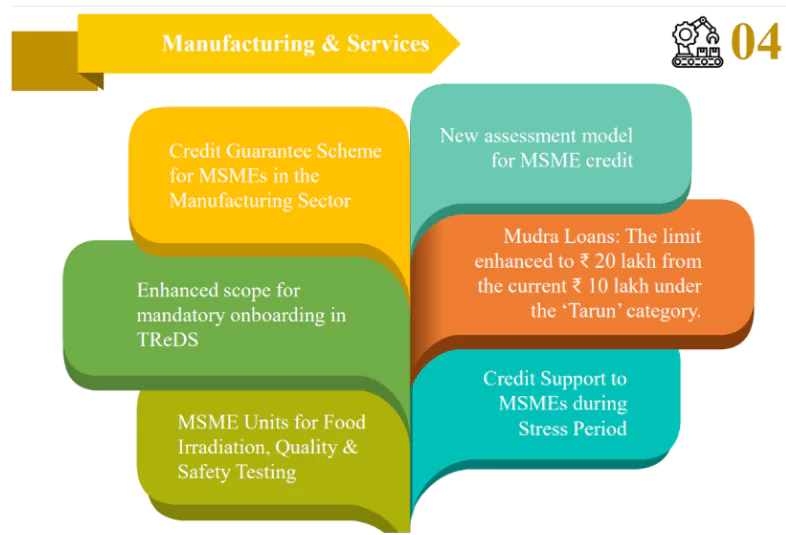The Union Finance Minister proposed various specific measures in support of Micro, Small and Medium Enterprises (MSMEs). The MSMEs are part of the four major themes in the Budget.
AboutMSMEs (Micro, Small and Medium Enterprises)
These are regulated under the Micro, Small & Medium Enterprises Development (MSMED) Act, 2006.
- Classification: Earlier, MSMEs were categorised based on the amount invested in plant and machinery/equipment. With revised regulations effective from July 2020, annual turnover has also been added as a criteria.
- Micro Enterprise: Investment in Plant and Machinery or Equipment is less than INR 1 crore and Annual Turnover is less than INR 5 crore.
- Small Enterprise: Investment in Plant and Machinery or Equipment is less than INR 10 crore and Annual Turnover is less than INR 5O crore.
- Medium Enterprise: Investment in Plant and Machinery or Equipment is less than INR 50 crore and Annual Turnover is less than INR 250 crore.
Enroll now for UPSC Online Course
MSMEs (Measures in Support for Micro, Small and Medium Enterprises)
The estimated budgetary allocation of Rs 22,138 crore to the MSME Ministry for 2024-25 is the same as the revised estimate for the previous financial year. However, various measures have been taken in the recently published Budget, which are as follows.

- MUDRA Loans Enhanced for Credit-Worthy Entrepreneurs to ₹20 Lakh: The Union Finance Minister proposed to enhance the limit of Mudra loans to ₹20 lakh from the current ₹10 lakh for those entrepreneurs who have availed and successfully repaid previous loans under the ‘Tarun’ category.
- The flagship scheme of the MSME Ministry was launched in 2015 to facilitate easy collateral-free micro-credit to non-corporate, non-farm small and micro-entrepreneurs for income-generating activities.
- Three products of MUDRA:
- Shishu: Covering loans up to Rs. 50,000
- Kishore: Covering loans above Rs. 50,000 and up to Rs. 5 lakh
- Tarun: Covering loans above Rs. 5 lakh and up to Rs. 10 lakh
- Public Sector Banks (PSBs) to develop New Assessment Model for MSME Credit: To make credit more accessible to MSMEs via a new, independent, and in-house mechanism, the Union Finance Minister proposed that PSBs will build their in-house capability to assess MSMEs for credit, instead of relying on external assessment.
- They will also take a lead in developing or getting developed a new credit assessment model, based on the scoring of digital footprints of MSMEs in the economy.
- This is expected to be a significant improvement over the traditional assessment of credit eligibility based only on asset or turnover criteria. That will also cover MSMEs without a formal accounting system.
- Credit Support to MSMEs during Stress Period from a Government Promoted Fund: The Union Finance Minister also proposed a new mechanism for facilitating continuation of bank credit to MSMEs during their stress period.
- It will be supported through a guarantee from a government promoted fund.
- While being in the ‘special mention account’ (SMA) stage for reasons beyond their control, MSMEs need credit to continue their business and to avoid getting into the Non-Performing Assets (NPA) stage.
- About Credit Guarantee Scheme for Machinery: The credit guarantee scheme for purchase of machinery and equipment without collateral will operate on pooling of credit risks of MSMEs seeking to benefit from the scheme.
- It will pool credit risks of MSMEs and will provide to each applicant guarantee cover up to 100 crore rupees.
- While the loan amount may be larger, the borrower will have to provide an upfront guarantee fee and an annual guarantee fee on the reducing loan balance.
 Turnover Threshold for Buyers Halved for Mandatory Onboarding in TReDS: The Union Finance Minister also decreased the turnover threshold of buyers for mandatory onboarding on the TReDS platform from Rs 500 crore to Rs 250 crore.
Turnover Threshold for Buyers Halved for Mandatory Onboarding in TReDS: The Union Finance Minister also decreased the turnover threshold of buyers for mandatory onboarding on the TReDS platform from Rs 500 crore to Rs 250 crore.
- TReDS is an online platform that allows MSMEs to unlock working capital by converting their trade receivables from buyers into cash.
- Significance: The recently taken measure will bring 22 more CPSEs and 7,000 more companies onto the platform.
- Medium enterprises will also be included in the scope of the suppliers.
- Doing away with external credit ratings, the reduction of the turnover threshold will significantly improve liquidity for smaller enterprises and unlock working capital more efficiently.
- New SIDBI Branches in MSME Clusters for Easier and Direct Credit Access: The Union Finance Minister proposed that SIDBI will open new branches to expand its reach to serve all major MSME clusters within 3 years, and provide direct credit to them.
- With the opening of 24 such branches this year, the service coverage will expand to 168 out of 242 major clusters.
- New MSME Units for Food Irradiation, Quality & Safety Testing: The Union Finance Minister proposed that financial support for setting up of 50 multi-product food irradiation units in the MSME sector will be provided.
- Setting up of 100 food quality and safety testing labs with NABL accreditation will be facilitated.
- E-Commerce Export Hubs MSMEs and Traditional Artisans to access to International Markets: To enable MSMEs and traditional artisans to sell their products in international markets, the Union Finance Minister proposed that E-Commerce Export Hubs will be set up in public-private-partnership (PPP) mode.
- These hubs, under a seamless regulatory and logistic framework, will facilitate trade and export related services under one roof.
Check Out UPSC CSE Books From PW Store
![]() 26 Jul 2024
26 Jul 2024

 Turnover Threshold for Buyers Halved for Mandatory Onboarding in TReDS: The Union Finance Minister also decreased the turnover threshold of buyers for mandatory onboarding on the TReDS platform from Rs 500 crore to Rs 250 crore.
Turnover Threshold for Buyers Halved for Mandatory Onboarding in TReDS: The Union Finance Minister also decreased the turnover threshold of buyers for mandatory onboarding on the TReDS platform from Rs 500 crore to Rs 250 crore.